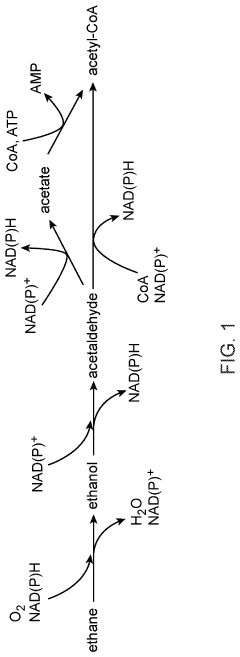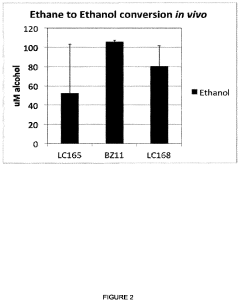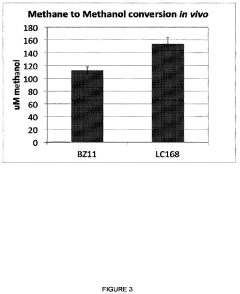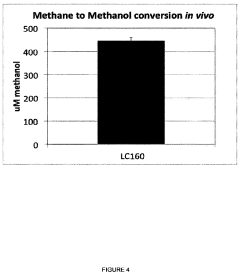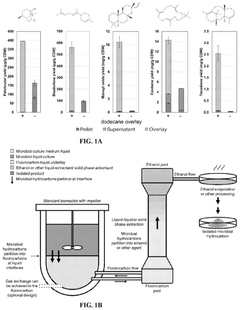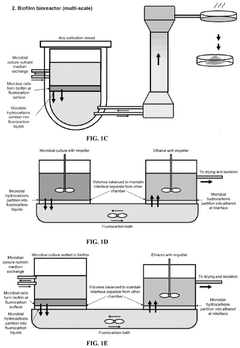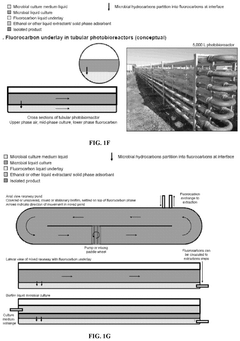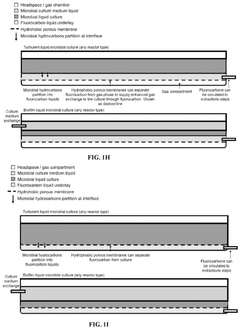Decane’s Involvement in Synthetic Biology Applications
JUL 28, 20259 MIN READ
Generate Your Research Report Instantly with AI Agent
Patsnap Eureka helps you evaluate technical feasibility & market potential.
Decane in Synbio: Background and Objectives
Decane, a saturated hydrocarbon with the molecular formula C10H22, has emerged as a significant player in the field of synthetic biology. This versatile compound, traditionally associated with petroleum-based products, is now finding novel applications in the realm of bioengineering and metabolic engineering. The integration of decane into synthetic biology represents a convergence of organic chemistry and biological systems, opening up new avenues for sustainable production of chemicals and fuels.
The primary objective of exploring decane's involvement in synthetic biology applications is to harness the potential of biological systems for the efficient and environmentally friendly production of this valuable hydrocarbon. Researchers aim to develop genetically engineered microorganisms capable of synthesizing decane through metabolic pathways, thereby reducing dependence on fossil fuel sources and minimizing environmental impact.
The evolution of decane's role in synthetic biology can be traced back to the early 2000s when scientists began exploring the possibility of microbial production of hydrocarbons. Initial efforts focused on understanding the natural biosynthetic pathways in certain organisms that produce alkanes, including decane. This foundational research paved the way for more targeted approaches in metabolic engineering and synthetic biology.
As the field progressed, researchers identified key enzymes and genetic pathways involved in decane biosynthesis. The discovery of aldehyde decarbonylases and acyl-ACP reductases in cyanobacteria and other organisms provided crucial insights into the biological production of medium-chain alkanes. These findings catalyzed efforts to engineer these pathways into model organisms such as Escherichia coli and Saccharomyces cerevisiae.
The technological landscape surrounding decane in synthetic biology has witnessed significant advancements in recent years. Cutting-edge techniques in genome editing, such as CRISPR-Cas9, have enabled precise genetic modifications, allowing for the optimization of decane production pathways. Additionally, the integration of systems biology approaches and metabolic modeling has enhanced our understanding of the complex interactions within engineered organisms, leading to improved strain designs and production efficiencies.
Looking ahead, the trajectory of decane in synthetic biology is poised for further innovation. Researchers are exploring novel enzyme engineering strategies to enhance the specificity and efficiency of decane-producing pathways. There is also growing interest in developing synthetic consortia of microorganisms that can work synergistically to produce decane from diverse feedstocks, including lignocellulosic biomass and waste materials.
The potential applications of biologically produced decane extend beyond traditional fuel uses. Emerging areas of interest include the development of bio-based lubricants, specialty chemicals, and advanced materials. These applications align with the broader goals of creating a sustainable bioeconomy and reducing the carbon footprint of industrial processes.
The primary objective of exploring decane's involvement in synthetic biology applications is to harness the potential of biological systems for the efficient and environmentally friendly production of this valuable hydrocarbon. Researchers aim to develop genetically engineered microorganisms capable of synthesizing decane through metabolic pathways, thereby reducing dependence on fossil fuel sources and minimizing environmental impact.
The evolution of decane's role in synthetic biology can be traced back to the early 2000s when scientists began exploring the possibility of microbial production of hydrocarbons. Initial efforts focused on understanding the natural biosynthetic pathways in certain organisms that produce alkanes, including decane. This foundational research paved the way for more targeted approaches in metabolic engineering and synthetic biology.
As the field progressed, researchers identified key enzymes and genetic pathways involved in decane biosynthesis. The discovery of aldehyde decarbonylases and acyl-ACP reductases in cyanobacteria and other organisms provided crucial insights into the biological production of medium-chain alkanes. These findings catalyzed efforts to engineer these pathways into model organisms such as Escherichia coli and Saccharomyces cerevisiae.
The technological landscape surrounding decane in synthetic biology has witnessed significant advancements in recent years. Cutting-edge techniques in genome editing, such as CRISPR-Cas9, have enabled precise genetic modifications, allowing for the optimization of decane production pathways. Additionally, the integration of systems biology approaches and metabolic modeling has enhanced our understanding of the complex interactions within engineered organisms, leading to improved strain designs and production efficiencies.
Looking ahead, the trajectory of decane in synthetic biology is poised for further innovation. Researchers are exploring novel enzyme engineering strategies to enhance the specificity and efficiency of decane-producing pathways. There is also growing interest in developing synthetic consortia of microorganisms that can work synergistically to produce decane from diverse feedstocks, including lignocellulosic biomass and waste materials.
The potential applications of biologically produced decane extend beyond traditional fuel uses. Emerging areas of interest include the development of bio-based lubricants, specialty chemicals, and advanced materials. These applications align with the broader goals of creating a sustainable bioeconomy and reducing the carbon footprint of industrial processes.
Market Analysis for Decane-Based Synbio Products
The market for decane-based synthetic biology products is experiencing significant growth, driven by the increasing demand for sustainable and bio-based alternatives across various industries. Decane, a versatile hydrocarbon, has found applications in synthetic biology due to its potential as a renewable fuel source and chemical building block. The global market for bio-based chemicals and materials is projected to reach $100 billion by 2025, with decane-derived products expected to capture a substantial share.
In the energy sector, decane-based biofuels are gaining traction as a potential replacement for conventional fossil fuels. The aviation industry, in particular, has shown keen interest in decane-derived sustainable aviation fuels (SAFs) to reduce carbon emissions. Major airlines and aircraft manufacturers are investing in research and development of these bio-based fuels, creating a robust market opportunity for decane-based products.
The chemical industry is another key market for decane-based synthetic biology applications. Decane serves as a precursor for various chemical intermediates and end products, including lubricants, surfactants, and polymers. The growing emphasis on green chemistry and sustainable manufacturing processes has led to increased demand for bio-based alternatives, positioning decane-derived chemicals favorably in the market.
Consumer goods and personal care industries are also exploring decane-based products for applications in cosmetics, fragrances, and household products. The shift towards natural and sustainable ingredients in these sectors is driving the adoption of bio-based alternatives, creating new market opportunities for decane-derived compounds.
Geographically, North America and Europe are leading the market for decane-based synthetic biology products, owing to stringent environmental regulations and strong research and development capabilities. However, the Asia-Pacific region is expected to witness the fastest growth, driven by rapid industrialization, increasing environmental awareness, and government initiatives promoting bio-based industries.
Key market players in the decane-based synthetic biology space include established chemical companies, biotechnology firms, and startups specializing in synthetic biology. These companies are investing heavily in research and development to improve production efficiency, reduce costs, and expand the range of applications for decane-derived products.
Challenges in the market include high production costs compared to conventional petroleum-based alternatives and scalability issues. However, ongoing technological advancements and increasing economies of scale are expected to address these challenges, further driving market growth. As sustainability becomes a central focus across industries, the market for decane-based synthetic biology products is poised for continued expansion in the coming years.
In the energy sector, decane-based biofuels are gaining traction as a potential replacement for conventional fossil fuels. The aviation industry, in particular, has shown keen interest in decane-derived sustainable aviation fuels (SAFs) to reduce carbon emissions. Major airlines and aircraft manufacturers are investing in research and development of these bio-based fuels, creating a robust market opportunity for decane-based products.
The chemical industry is another key market for decane-based synthetic biology applications. Decane serves as a precursor for various chemical intermediates and end products, including lubricants, surfactants, and polymers. The growing emphasis on green chemistry and sustainable manufacturing processes has led to increased demand for bio-based alternatives, positioning decane-derived chemicals favorably in the market.
Consumer goods and personal care industries are also exploring decane-based products for applications in cosmetics, fragrances, and household products. The shift towards natural and sustainable ingredients in these sectors is driving the adoption of bio-based alternatives, creating new market opportunities for decane-derived compounds.
Geographically, North America and Europe are leading the market for decane-based synthetic biology products, owing to stringent environmental regulations and strong research and development capabilities. However, the Asia-Pacific region is expected to witness the fastest growth, driven by rapid industrialization, increasing environmental awareness, and government initiatives promoting bio-based industries.
Key market players in the decane-based synthetic biology space include established chemical companies, biotechnology firms, and startups specializing in synthetic biology. These companies are investing heavily in research and development to improve production efficiency, reduce costs, and expand the range of applications for decane-derived products.
Challenges in the market include high production costs compared to conventional petroleum-based alternatives and scalability issues. However, ongoing technological advancements and increasing economies of scale are expected to address these challenges, further driving market growth. As sustainability becomes a central focus across industries, the market for decane-based synthetic biology products is poised for continued expansion in the coming years.
Current Challenges in Decane Synbio Integration
The integration of decane into synthetic biology applications faces several significant challenges that hinder its widespread adoption and efficient utilization. One of the primary obstacles is the toxicity of decane to many microorganisms commonly used in synthetic biology. This toxicity can severely limit the growth and productivity of engineered organisms, making it difficult to achieve high yields of decane or decane-derived products.
Another major challenge lies in the metabolic engineering of organisms to produce decane efficiently. While some natural pathways for decane biosynthesis exist, they are often not optimized for industrial-scale production. Researchers struggle to identify and implement the most effective enzymatic pathways that can convert cellular metabolites into decane with high efficiency and minimal byproduct formation.
The solubility of decane in aqueous cellular environments poses an additional hurdle. As a highly hydrophobic molecule, decane tends to form a separate phase in fermentation broths, which can lead to reduced bioavailability and complicate product recovery processes. This phase separation can also interfere with cellular metabolism and potentially damage cell membranes, further impacting production efficiency.
Scaling up decane production from laboratory to industrial levels presents its own set of challenges. The volatility of decane can lead to significant product loss during fermentation, requiring specialized containment and recovery systems. Additionally, the energy requirements for decane production and separation from the fermentation broth can be substantial, potentially impacting the economic viability of large-scale processes.
Regulatory and safety concerns also play a role in the challenges facing decane integration in synthetic biology. As a flammable hydrocarbon, decane requires careful handling and storage, which can increase operational costs and complexity. Moreover, the use of genetically modified organisms for decane production may face regulatory scrutiny, particularly in applications related to fuel or consumer products.
Lastly, the development of robust and stable production strains remains a significant challenge. Engineered organisms often face evolutionary pressure to revert to their wild-type state, especially when producing compounds that may be toxic or metabolically burdensome. Maintaining genetic stability and consistent production over extended periods is crucial for industrial applications but can be difficult to achieve with current technologies.
Another major challenge lies in the metabolic engineering of organisms to produce decane efficiently. While some natural pathways for decane biosynthesis exist, they are often not optimized for industrial-scale production. Researchers struggle to identify and implement the most effective enzymatic pathways that can convert cellular metabolites into decane with high efficiency and minimal byproduct formation.
The solubility of decane in aqueous cellular environments poses an additional hurdle. As a highly hydrophobic molecule, decane tends to form a separate phase in fermentation broths, which can lead to reduced bioavailability and complicate product recovery processes. This phase separation can also interfere with cellular metabolism and potentially damage cell membranes, further impacting production efficiency.
Scaling up decane production from laboratory to industrial levels presents its own set of challenges. The volatility of decane can lead to significant product loss during fermentation, requiring specialized containment and recovery systems. Additionally, the energy requirements for decane production and separation from the fermentation broth can be substantial, potentially impacting the economic viability of large-scale processes.
Regulatory and safety concerns also play a role in the challenges facing decane integration in synthetic biology. As a flammable hydrocarbon, decane requires careful handling and storage, which can increase operational costs and complexity. Moreover, the use of genetically modified organisms for decane production may face regulatory scrutiny, particularly in applications related to fuel or consumer products.
Lastly, the development of robust and stable production strains remains a significant challenge. Engineered organisms often face evolutionary pressure to revert to their wild-type state, especially when producing compounds that may be toxic or metabolically burdensome. Maintaining genetic stability and consistent production over extended periods is crucial for industrial applications but can be difficult to achieve with current technologies.
Existing Decane Synbio Applications
01 Synthesis and purification of decane
Decane can be synthesized through various chemical processes, including the reduction of fatty acids or their derivatives. Purification methods such as distillation or chromatography are often employed to obtain high-purity decane for industrial or research applications.- Synthesis and applications of decane derivatives: Decane and its derivatives are used in various chemical processes and applications. These include the synthesis of organic compounds, use as solvents, and in the production of polymers and other industrial materials. The versatility of decane-based compounds makes them valuable in multiple industries.
- Decane in pharmaceutical compositions: Decane and its derivatives are utilized in pharmaceutical formulations. They can serve as carriers, solvents, or active ingredients in various drug compositions. The properties of decane-based compounds contribute to improved drug delivery and efficacy in certain medical applications.
- Decane in fuel and energy applications: Decane is an important component in fuel formulations and energy-related applications. It is used in the development of high-performance fuels, lubricants, and as a reference compound in fuel research. The properties of decane make it valuable in improving fuel efficiency and performance.
- Decane in polymer and material science: Decane plays a role in polymer chemistry and material science. It is used in the synthesis of various polymers, as a component in material formulations, and in the development of advanced materials with specific properties. The incorporation of decane-based compounds can enhance the characteristics of polymers and materials.
- Decane in separation and purification processes: Decane is employed in separation and purification processes across various industries. It can be used as a solvent for extraction, in chromatography techniques, and in the purification of chemical compounds. The properties of decane make it suitable for selective separation and purification applications.
02 Use of decane in polymer production
Decane is utilized in the production of various polymers, serving as a solvent, chain transfer agent, or component in polymerization reactions. It can influence the properties of the resulting polymers, such as molecular weight distribution and crystallinity.Expand Specific Solutions03 Decane as a component in fuel formulations
Decane is an important component in various fuel formulations, particularly in diesel and jet fuels. It contributes to the fuel's combustion properties, energy content, and overall performance in engines.Expand Specific Solutions04 Applications of decane in pharmaceutical industry
Decane finds applications in the pharmaceutical industry, where it can be used as a solvent, intermediate, or component in drug formulations. It may also be involved in the synthesis of certain pharmaceutical compounds.Expand Specific Solutions05 Decane in chemical reactions and processes
Decane serves as a reactant or intermediate in various chemical reactions and processes. It can undergo transformations such as oxidation, dehydrogenation, or isomerization to produce valuable chemical products or serve as a model compound for studying reaction mechanisms.Expand Specific Solutions
Key Players in Decane Synbio Research
The competitive landscape for decane's involvement in synthetic biology applications is evolving rapidly, reflecting the field's early developmental stage. The market size is expanding as more companies recognize the potential of decane in various bioengineering processes. While the technology is still maturing, several key players are making significant strides. Companies like BASF Corp., Industrial Microbes, Inc., and Amyris, Inc. are at the forefront, leveraging their expertise in industrial biotechnology to develop innovative applications. Academic institutions such as Harvard College and California Institute of Technology are contributing crucial research. The involvement of major petrochemical companies like China Petroleum & Chemical Corp. indicates growing industry interest, suggesting a promising future for decane in synthetic biology.
BASF Corp.
Technical Solution: BASF has invested in synthetic biology approaches for sustainable chemical production, including decane. Their strategy involves metabolic engineering of microbial hosts to produce fatty acids and alkanes. BASF's researchers have developed genetically modified E. coli strains capable of producing medium-chain fatty acids, which serve as precursors for decane synthesis[4]. The company has also explored the use of cyanobacteria for direct photosynthetic production of alkanes, including decane, from CO2 and sunlight[5]. BASF's process integrates biocatalytic steps with traditional chemical catalysis to optimize overall yield and selectivity in decane production[6].
Strengths: Strong R&D capabilities, integration with existing chemical processes, potential for CO2 utilization. Weaknesses: Early stage of development for some approaches, scaling challenges for photosynthetic production.
Industrial Microbes, Inc.
Technical Solution: Industrial Microbes specializes in engineering microorganisms for the production of chemicals from waste gases. For decane production, they have developed a gas fermentation platform that utilizes methane or carbon dioxide as feedstocks. Their engineered microbes incorporate synthetic pathways for alkane biosynthesis, including decane, directly from C1 carbon sources[7]. The company has achieved significant improvements in productivity through adaptive laboratory evolution and genome-scale metabolic engineering[8]. Industrial Microbes' process offers a unique approach to decane production that can potentially utilize industrial waste gases or captured CO2 as raw materials[9].
Strengths: Utilization of low-cost or waste feedstocks, potential for carbon-negative production, unique market positioning. Weaknesses: Technology still in development stage, potential challenges in scaling gas fermentation processes.
Innovative Decane Synbio Techniques
Heterologous expression of short-chain monooxygenases in microorganisms
PatentPendingUS20240043816A1
Innovation
- A monooxygenase synthetic polynucleotide is disclosed, comprising a coding region for a soluble diiron monooxygenase enzyme linked to a promoter, which can be expressed in a microorganism, along with accessory protein folding chaperones to enhance enzyme activity and substrate specificity, allowing for the conversion of short alkanes into industrial products.
Biocompatible underlays for living extraction of hydrocarbons from engineered microbes
PatentPendingUS20240360481A1
Innovation
- The use of denser-than-water, biocompatible, and non-toxic liquid perfluorocarbons as an underlay in microbial cultures for extracting hydrophobic metabolites, combined with a secondary extraction step using environmentally friendly solvents like ethanol, allows for continuous and non-destructive extraction of metabolites at standard ambient temperature and pressure.
Environmental Impact of Decane in Synbio
The environmental impact of decane in synthetic biology applications is a critical consideration as this field continues to advance. Decane, a hydrocarbon commonly used in various industrial processes, has found its way into synbio applications due to its versatile properties. However, its utilization raises concerns about potential ecological consequences.
One of the primary environmental impacts of decane in synbio is its potential for contamination of soil and water systems. As a hydrocarbon, decane can persist in the environment and may accumulate in sediments or aquatic ecosystems if not properly managed. This persistence can lead to long-term effects on local flora and fauna, potentially disrupting ecological balances.
Air pollution is another significant concern associated with decane use in synthetic biology. Volatile organic compounds (VOCs) released during decane production or application can contribute to smog formation and negatively impact air quality. This is particularly relevant in industrial settings where large-scale synbio processes involving decane are conducted.
The production of decane itself, whether through traditional petrochemical methods or novel synthetic biology approaches, also carries environmental implications. Energy-intensive manufacturing processes can contribute to greenhouse gas emissions, exacerbating climate change concerns. Additionally, the sourcing of raw materials for decane production may lead to habitat destruction or resource depletion if not managed sustainably.
However, it's important to note that synthetic biology applications involving decane also present opportunities for environmental benefits. For instance, engineered microorganisms capable of producing or metabolizing decane could be used in bioremediation efforts to clean up hydrocarbon-contaminated sites. This potential for environmental restoration showcases the dual nature of decane's impact in synbio applications.
The lifecycle analysis of decane in synthetic biology processes is crucial for understanding its full environmental impact. From production to application and eventual disposal or degradation, each stage presents unique challenges and opportunities for minimizing ecological footprints. Implementing closed-loop systems and developing more efficient production methods could significantly reduce the overall environmental impact of decane in synbio applications.
As research in this field progresses, there is a growing focus on developing alternatives to decane that offer similar functionality with reduced environmental risks. This includes exploring bio-based alternatives or designing synthetic compounds that are more readily biodegradable. Such innovations could pave the way for more sustainable practices in synthetic biology, mitigating the potential negative impacts associated with decane use.
One of the primary environmental impacts of decane in synbio is its potential for contamination of soil and water systems. As a hydrocarbon, decane can persist in the environment and may accumulate in sediments or aquatic ecosystems if not properly managed. This persistence can lead to long-term effects on local flora and fauna, potentially disrupting ecological balances.
Air pollution is another significant concern associated with decane use in synthetic biology. Volatile organic compounds (VOCs) released during decane production or application can contribute to smog formation and negatively impact air quality. This is particularly relevant in industrial settings where large-scale synbio processes involving decane are conducted.
The production of decane itself, whether through traditional petrochemical methods or novel synthetic biology approaches, also carries environmental implications. Energy-intensive manufacturing processes can contribute to greenhouse gas emissions, exacerbating climate change concerns. Additionally, the sourcing of raw materials for decane production may lead to habitat destruction or resource depletion if not managed sustainably.
However, it's important to note that synthetic biology applications involving decane also present opportunities for environmental benefits. For instance, engineered microorganisms capable of producing or metabolizing decane could be used in bioremediation efforts to clean up hydrocarbon-contaminated sites. This potential for environmental restoration showcases the dual nature of decane's impact in synbio applications.
The lifecycle analysis of decane in synthetic biology processes is crucial for understanding its full environmental impact. From production to application and eventual disposal or degradation, each stage presents unique challenges and opportunities for minimizing ecological footprints. Implementing closed-loop systems and developing more efficient production methods could significantly reduce the overall environmental impact of decane in synbio applications.
As research in this field progresses, there is a growing focus on developing alternatives to decane that offer similar functionality with reduced environmental risks. This includes exploring bio-based alternatives or designing synthetic compounds that are more readily biodegradable. Such innovations could pave the way for more sustainable practices in synthetic biology, mitigating the potential negative impacts associated with decane use.
Regulatory Framework for Decane Synbio
The regulatory framework for decane's involvement in synthetic biology applications is a complex and evolving landscape. As synthetic biology continues to advance, governments and regulatory bodies worldwide are grappling with the need to establish comprehensive guidelines that ensure safety, ethical practices, and responsible development in this field.
At the international level, organizations such as the United Nations Convention on Biological Diversity (CBD) and the World Health Organization (WHO) have been working to develop overarching principles for the governance of synthetic biology. These efforts aim to create a harmonized approach to regulation across different countries and regions.
In the United States, the regulatory oversight of synthetic biology applications involving decane falls under the purview of multiple agencies. The Environmental Protection Agency (EPA) regulates the production and use of genetically engineered microorganisms under the Toxic Substances Control Act (TSCA). The Food and Drug Administration (FDA) oversees the safety and efficacy of synthetic biology products intended for human or animal consumption.
The European Union has implemented a more precautionary approach to synthetic biology regulation. The EU's Directive on the Deliberate Release of Genetically Modified Organisms (GMOs) into the Environment provides a framework for assessing and managing risks associated with synthetic biology applications, including those involving decane.
Key regulatory considerations for decane-related synthetic biology applications include biosafety measures, environmental impact assessments, and containment protocols. Regulatory bodies typically require detailed risk assessments and monitoring plans before approving the use or release of synthetic organisms producing decane.
Intellectual property rights also play a crucial role in the regulatory landscape. Patent offices worldwide are grappling with the challenges of assessing the patentability of synthetic biology inventions, including those related to decane production. The balance between encouraging innovation and preventing the monopolization of fundamental biological processes remains a contentious issue.
As the field of synthetic biology continues to evolve, regulatory frameworks are likely to undergo further refinement. Emerging areas of focus include the development of standardized risk assessment methodologies, the establishment of international data-sharing mechanisms, and the creation of adaptive regulatory approaches that can keep pace with rapid technological advancements in the field.
At the international level, organizations such as the United Nations Convention on Biological Diversity (CBD) and the World Health Organization (WHO) have been working to develop overarching principles for the governance of synthetic biology. These efforts aim to create a harmonized approach to regulation across different countries and regions.
In the United States, the regulatory oversight of synthetic biology applications involving decane falls under the purview of multiple agencies. The Environmental Protection Agency (EPA) regulates the production and use of genetically engineered microorganisms under the Toxic Substances Control Act (TSCA). The Food and Drug Administration (FDA) oversees the safety and efficacy of synthetic biology products intended for human or animal consumption.
The European Union has implemented a more precautionary approach to synthetic biology regulation. The EU's Directive on the Deliberate Release of Genetically Modified Organisms (GMOs) into the Environment provides a framework for assessing and managing risks associated with synthetic biology applications, including those involving decane.
Key regulatory considerations for decane-related synthetic biology applications include biosafety measures, environmental impact assessments, and containment protocols. Regulatory bodies typically require detailed risk assessments and monitoring plans before approving the use or release of synthetic organisms producing decane.
Intellectual property rights also play a crucial role in the regulatory landscape. Patent offices worldwide are grappling with the challenges of assessing the patentability of synthetic biology inventions, including those related to decane production. The balance between encouraging innovation and preventing the monopolization of fundamental biological processes remains a contentious issue.
As the field of synthetic biology continues to evolve, regulatory frameworks are likely to undergo further refinement. Emerging areas of focus include the development of standardized risk assessment methodologies, the establishment of international data-sharing mechanisms, and the creation of adaptive regulatory approaches that can keep pace with rapid technological advancements in the field.
Unlock deeper insights with Patsnap Eureka Quick Research — get a full tech report to explore trends and direct your research. Try now!
Generate Your Research Report Instantly with AI Agent
Supercharge your innovation with Patsnap Eureka AI Agent Platform!
